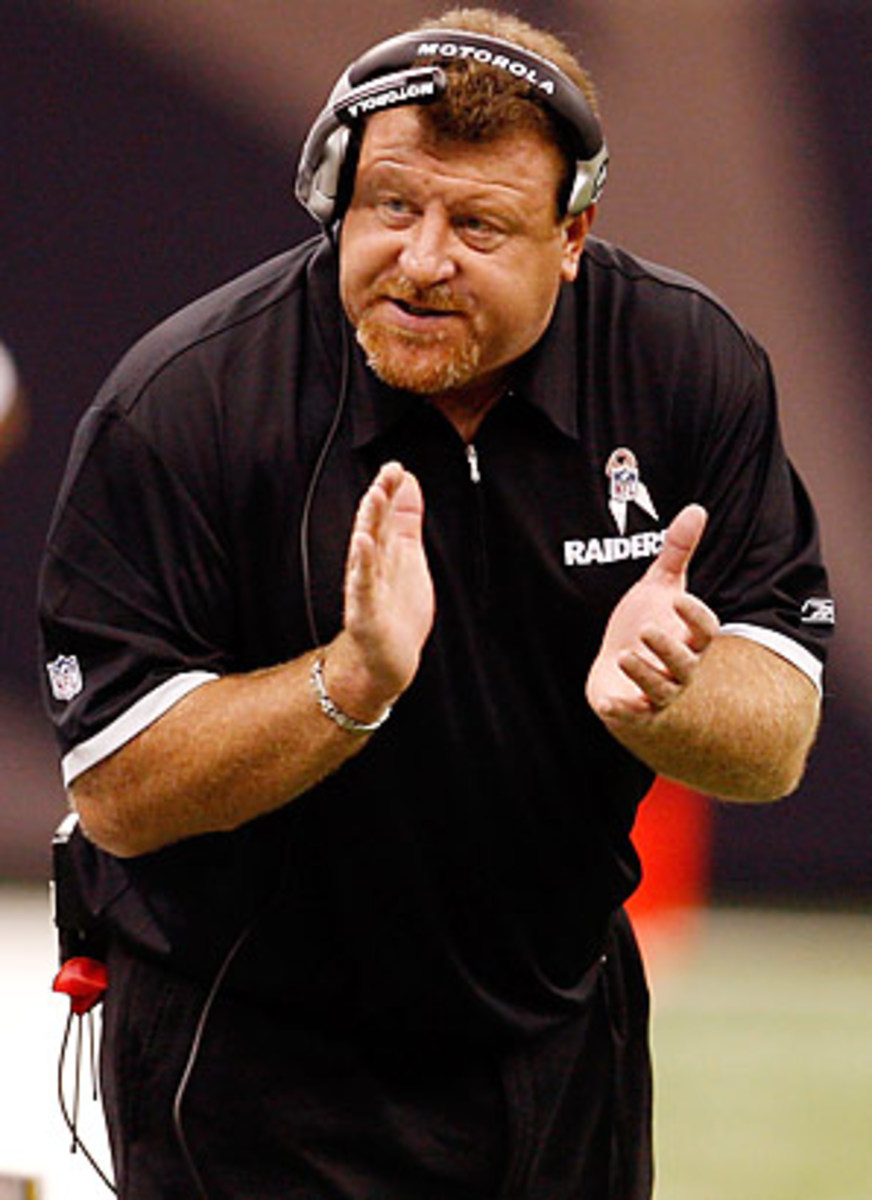Raiders' turmoil shines light on risks of mismatched coaching staff
When he was named interim coach last October, after Lane Kiffin was fired four games into his second season, Tom Cable sat in on a defensive staff meeting at the Raiders' training facility. The assistants were giving their thoughts on this and that when assistant secondary coach Randy Hanson began to speak.
At that point Cable basically waved off Hanson and told him to stop talking, adding that he didn't want to hear anymore from him. Then, according to one assistant in the room, Cable said to Hanson: "If I could fire you today, I would."
Cable denies the exchange, but a second assistant later confirmed the story to SI.com.
This isn't brought up in an attempt to draw a link to allegations that Cable struck Hanson earlier this month and broke his jaw -- although you'd have to be a member of the original O.J. jury to believe "nothing happened," as Cable claims. Rather it's brought up to address the larger point of how management plays with fire when it doesn't allow head coaches to select their staffs.
Cable, who was made the fulltime coach in February, claims he and managing general partner Al Davis were on the same page when choosing assistant coaches. But it would take a moon-leap of faith to believe that Cable wanted Hanson, who actually was demoted this year to defensive assistant.
The belief among many people in the building is that Hanson is on the payroll largely because he is loyal to Davis, who always has been a sucker for anyone professing their love for the Silver and Black. Last year Hanson told the Contra Costa Times that working for the Raiders was his "dream" job, something he wanted "all his life."
That has created the perception that he is a snitch for Davis, which fosters an air of distrust among some staff members. Sadly, Davis should have known how this was going to end. He required Kiffin to keep former defensive coordinator Rob Ryan and the two never got along, ultimately creating a rift on the team between the offensive and defensive staffs.
There are examples of situations where things turned out positively when a coach included holdovers on his staff: Tony Dungy did not touch the offensive staff after joining the Colts, and Mike Tomlin left the defensive staff in tact after being hired by the Steelers.
But more times than not, things wind up deteriorating when management gets involved. Marty Schottenheimer quit one job (Browns) and was fired from another (Chargers) when he refused to let higher-ups tell him who to hire. And Jim Mora Sr. has said he was fired by the Colts after he refused to make staff changes that management wanted. Dom Capers' ouster in Houston was also tied to differences over his staff.
More recent examples:
-- In 2007, San Diego, Ted Cottrell basically was hired to be defensive coordinator before Norv Turner was hired to be head coach. Turner knew management wanted Cottrell in that position, so rather than fight it --and possibly be passed over -- he co-signed on it. By the middle of their second season together, Cottrell was fired and Turner was able to promote the guy he wanted in that position all along, linebackers coach Ron Rivera, who came to San Diego with Turner.
-- In 2007, Arizona, Ken Whisenhunt wanted to bring in his own guys after being hired. However, management asked him to keep defensive coordinator Clancy Pendergast because Pendergast was familiar with the personnel and had had some success. Whisenhunt acquiesced, but after the unit surrendered 27 or more points in six games last season, including five games in which it allowed 35 or more, he decided a change was needed -- despite the Cardinals reaching the Super Bowl last season.
"The change was about productivity more than anything else," Whisenhunt says. "Looking at it over a period of years, not just a few games or a season, I felt that if we hold our players accountable for their performance, then we have to be true to that with our staff."
Whisenhunt praised Pendergast as a coach, but clearly the fit wasn't right. The same could be said in Oakland, where Hanson has been a lightning rod of controversy since Kiffin suspended him last season for conduct he considered to be detrimental to the team. The discipline was done without the approval of Davis, who immediately reinstated Hanson. That further created the perception that Hanson was a Davis guy.
Said Hanson to the Contra Costa Times last year: "I'm on the side of the Raiders and the players, and anybody who isn't on the side of the Raiders, then I'm not with them."
Asked Wednesday about the importance of a coach selecting his own staff, Cable said: "It's real important. These are guys you're going to work with every day, for long hours. I wanted a good mix of experience and youth, and we got that. The good thing here is that we were all on the same page [about the hires]."
If he says it enough times, maybe he can get others to believe it. Or even himself.






